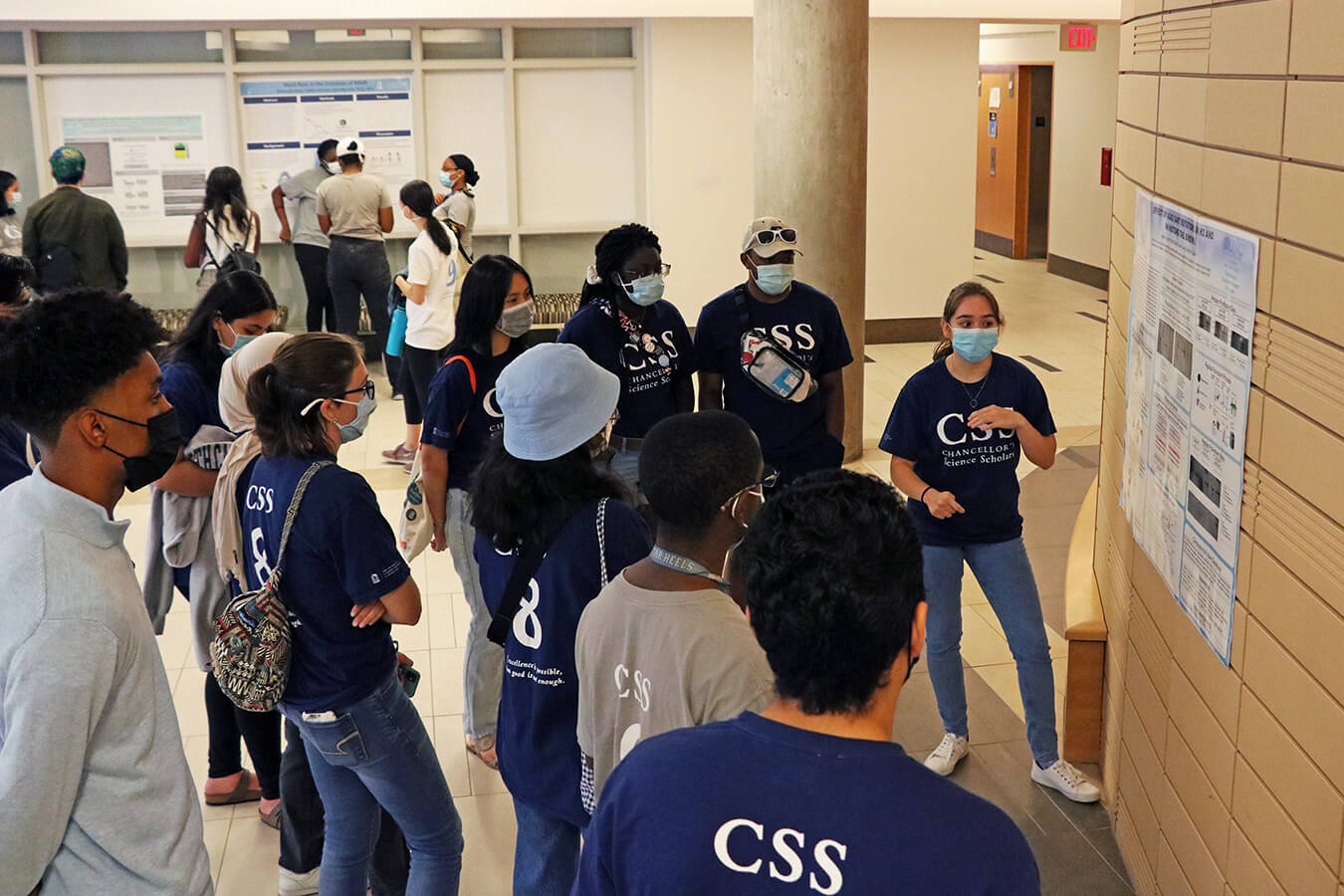
CSS Annual Research Symposium showcases scholars’ work
October 13, 2021
A necessary step in the transition from student to scientist comes when scholars develop the communication skills needed to share their research process and findings with a broader audience. At the CSS Annual Research Symposium, held during UNC’s Family Weekend in October, scholars had an opportunity to practice their presentation skills in front of peers and family members.
Seniors from Cohort 6 gave 10-minute oral presentations and fielded questions from the audience, followed by a poster session featuring summer research projects from scholars in Cohorts 6-8.
“I was nervous at first, because this was my first time presenting my research to anyone outside of my lab,” said biology major Najla Ward-Conyers (UNC ’22, CSS 6), who shared information about her work on antibiotic resistance in UNC’s Neher Lab .
“I was so excited to show everyone what I have been working on, and they were all happy for me and eager to learn more,” she added. “I’m really happy I was chosen to present.”
“Strong science communication skills are vital for today’s researchers and leaders in STEM fields,” said Dr. Thomas Freeman, CSS executive director. “By providing opportunities for our scholars to develop these skills, at events like this as well as national research conferences, we are preparing them to step into future roles as leaders and educators.”
Those in attendance learned about topics in biology, chemistry, computer science, neuroscience, physics, and public health—an experience that is especially valuable to the newest CSS cohorts as they consider what labs and research questions they would like to explore during their time at Carolina.
“I really appreciated seeing all the research and accomplishments that Chancellor’s Science Scholars were achieving,” said Bilal Azzam, a biology and business administration double-major from CSS 8. “As a sophomore, I look up to the older scholars and their work, and it meant so much to see first-hand where CSS can take me in terms of research.”
Oral Presentations:
Regulating CBX4 Expression Using Antisense Oligonucleotides
Dalal Azzam, CSS 6
Segmentor: Training a Machine Learning Algorithm to Optimize the Accuracy of Automatic Brain Segmentation
Carla Escobar-Tomlienovich, CSS 6
Epigenetic Impact of PFOS on JEG-3 Placental Cells via ATAC Sequencing and RNA Sequencing Analyses.
Ashleigh Henry, CSS 6
Confirming Wnt Pathway Activation by Construct Validation
Paloma Ruiz, CSS 6
Characterization of Lead Compounds that Modulate Macrophage Phenotype
Yolanda Simpson, CSS 6
Developing Escherichia coli as a model system for antibiotic resistance: Investigating a role for the Reactive Chlorine Stress operon in metronidazole resistance
Najla Ward-Conyers, CSS 6
Poster Presentations:
Assessing Transcriptional and Epigenetic Impacts of Antipsychotics
Jasmine Akoto, CSS 6
Effect of ADA2 Sant Mutations on H3 and H4 Histone-Tail Binding
Ashley Aragon, CSS 8
Transit Hunt for Young and Maturing Exoplanets (THYME) VI: a Pleiades-age association harboring a transiting planet detected by Kepler
Madyson Barber, CSS 6
Impact of the SARS-CoV-2 Pandemic on Pediatric Immunizations in North Carolina
Noë Brown, CSS 7
MutS Role in the Initiation of MMR
Breannah Keys, CSS 6
Perceived Need and Desired Features for a News Authentication Tool
Ayana Monroe, CSS 7
Inorganic arsenic exposure alters CpG methylation of imprinted genes in a human placental cell line
Cinthya Plazas, CSS 6
Simulation of Aging Effects on Achilles Tendon Tissue Response to Gastrocnemius and Soleus Muscle Stimulation
Maggie Wagner, CSS 6
